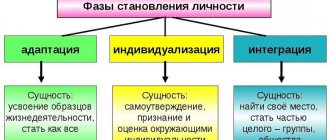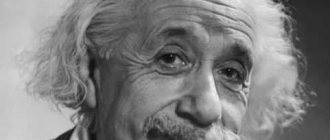Author - A.N. Leontyev. The book “Activity, consciousness, personality.” Chapter Personality formation.
The situation of the development of a human individual reveals its characteristics already at the very first stages. The main one is the indirect nature of the child’s connections with the outside world.
Initially, direct biological connections between child and mother are very soon mediated by objects: the mother feeds the child from a cup, puts clothes on him and, keeping him occupied, manipulates a toy.
At the same time, the child’s connections with things are mediated by the people around him: the mother brings the child closer to the thing that attracts him, brings it to him, or, perhaps, takes it away from him. In a word, the child’s activity increasingly appears as realizing his connections with a person through things, and connections with things through a person.
This developmental situation leads to the fact that things are revealed to the child not only in their physical properties, but also in the special quality that they acquire in human activity - in their functional meaning (a cup - what they drink from, a chair - what they sit on, a watch - what is worn on the hand, etc.), and people are like the “lords” of these things, on which his connections with them depend. The child’s objective activity acquires an instrumental structure, and communication becomes verbal, mediated by language.
This initial situation of the child’s development contains the seed of those relationships, the further development of which constitutes a chain of events leading to the formation of him as a personality. Initially, relationships to the world of things and to the people around them are fused with each other for the child, but then they split, and they form different, although interconnected, lines of development that transform into each other.
In ontogenesis, these transitions are expressed in alternating changes of phases: phases of predominantly development of objective (practical and cognitive) activity - phases of development of relationships with people, with society. But the same transitions characterize the movement of motives within each phase. As a result, those hierarchical connections of motives arise that form the “nodes” of personality.
Tying these knots is a hidden process and is expressed differently at different stages of development.
Above, I described one of the phenomena that characterizes the mechanism of this process at the stage when the inclusion of the child’s objective action in his relation to the currently absent adult, although it changes the meaning of the achieved result, the action itself still remains completely “field”.
How do further changes occur? Facts obtained in a study of preschoolers of different ages show that these changes obey certain rules.
One of them is that in a situation of multidirectional motivation, the subordination of action to a person’s requirement occurs earlier, and later – to objective interdisciplinary connections.
Another rule discovered in the experiments also looks somewhat paradoxical: it turns out that in conditions of doubly motivated activity, an objective-material motive is able to perform the function of subordinating another earlier, when it is given to the child in the form of only a representation, mentally, and only later - remaining in the actual field of perception .
Although these rules express genetic sequence, they also have a general meaning. The fact is that when situations of the described type become aggravated, the phenomenon of displacement (decalage) arises, as a result of which these simpler control relations are exposed; it is known, for example, that it is easier to launch an attack under a direct order from a commander than under a self-command.
As for the form in which motives appear, in difficult circumstances of volitional activity it is very clearly revealed that only an ideal motive, i.e. a motive lying outside the external field vectors is capable of subordinating actions with oppositely directed external motives.
Figuratively speaking, the psychological mechanism of life-deed can be sought in the human imagination.
The process of personality formation from the side of the changes in question can be presented as the development of will, and this is not accidental. A weak-willed, impulsive action is an impersonal action, although the loss of will can only be spoken of in relation to the individual (after all, you cannot lose what you do not have).
Therefore, authors who consider will to be the most important personality trait are right from an empirical point of view. Will, however, is neither the beginning nor even the “core” of personality; it is only one of its expressions.
The real basis of personality is that special structure of the subject’s total activities that arises at a certain stage in the development of his human connections with the world.
Man lives, as it were, in a reality that is ever expanding for him. Initially, this is a narrow circle of people and objects immediately surrounding him, interaction with them, their sensory perception and assimilation of what is known about them, assimilation of their meanings.
But then a reality begins to open up to him that lies far beyond the boundaries of his practical activity and direct communication: the boundaries of the cognizable world he represents are expanding.
The true “field” that now determines his actions is not just present, but existing - existing objectively or sometimes only illusory.
The subject's knowledge of this existing always precedes its transformation into something that determines his activity. Such knowledge plays a very important role in the formation of motives.
At a certain level of development, motives first appear as only “known”, as possible, not yet actually motivating any action.
To understand the process of personality formation, this must certainly be taken into account, although the expansion of knowledge in itself is not decisive for it; That is why, by the way, the education of the individual cannot be reduced to teaching, to the imparting of knowledge.
The formation of personality involves the development of the process of goal formation and, accordingly, the development of the subject’s actions. Actions, becoming more and more enriched, seem to outgrow the range of activities that they implement and come into conflict with the motives that gave rise to them.
The phenomena of such outgrowth are well known and are constantly described in the literature on developmental psychology, albeit in different terms; These are what form the so-called developmental crises - the crisis of three years, seven years, adolescence, as well as much less studied crises of maturity. As a result, there is a shift of motives to goals, a change in their hierarchy and the birth of new motives - new types of activities; previous goals are psychologically discredited, and the actions corresponding to them either cease to exist altogether or turn into impersonal operations.
Personality
From the very beginning, Leontief introduced into these works a fundamental departure from the views of most of his contemporary psychologists.
“In the ordinary, worldly understanding,” writes A.N. Leontiev in his Methodical Notebooks is what controls individual processes of activity and behavior. This is the “master” of processes. Leontyev believes that this is a common way of thinking. Actually, no: Personality is not a special quality or interconnection of mental processes, it has a different nature: “The problem of personality is a problem of unity, the interconnection of individual activity.”
The difference between these formulations is very significant. The interconnection of mental processes is what relates to mental reality. Thus, we classify personality as a general category of the psyche; personality turns out to be one of the structures of the psyche. A.N. Leontiev, on the other hand, fundamentally takes the concept of personality beyond the concept of the psyche to the level of relations with the world; as he later put it, “the problem of personality forms a new psychological dimension: a new one, different from the dimension in which the study of this or that mental process occurs.” This position, coming from Vygotsky, fundamentally distinguishes the approach of A.N. Leontyev from the views of A.F. Lazursky, S.L. Rubinshteina, V.S. Merlin and almost all other domestic and foreign authors. According to the ideas of A.N. Leontiev, personality is a special reality that deserves special attention: “Personality is not a simple biological being, it is a higher essence, historical (social) nature.” This unity, identity, is not given initially. A person is not born as an individual. A person’s personality arises in the process of development of his life.”
Thus, Leontiev defines personality as a context, a hierarchy of activity, and not mental processes. “A person becomes a person... during his biography. In this sense, personality is a “blood clot” of biography.” In other words, personality is neither biological, nor social, nor conditions, nor factors, but is a biography, life experience! Personality is the result of the “crystallization” of biography. This is the first dissertation of A.N. Leontyev.
The second thesis: personality develops, that is, there are qualitatively special stages of personality development that have nothing to do with the development of mental processes. The third thesis: personality has a structure. At the very beginning, a distinction is introduced between man and personality. If a person is a type of biological formation, a unit of natural organs and their functions, then a person is a non-biological entity. It arises gradually and takes shape throughout life, so that a personality structure emerges and at the same time a personality independent of the personality.
Indeed, the same general idea, albeit in slightly different terms, is echoed in Activity more than three decades later. Consciousness. Personality." Leontyev begins his analysis of personality with the important thesis that personality is not everything in a person. There is something that has nothing to do with personality, and there is something that does, but it is not known in advance. “The same characteristics of a person can have different relationships with their personality.” Our task, writes A.N. Leontiev, “requires us to understand personality as a psychological reformation that is formed in the life relationships of the individual.” Everything else - both natural and social - is a necessary condition for the development of personality, from which development itself cannot be derived.
Personality first arises when a person enters history, and he becomes a person only as a subject of social relations. “A person’s personality in no way exists in relation to his activity, since his consciousness is generated by him.”
Position of A.N. Leontiev’s approach to personality as an “internal moment” of activity caused a lot of criticism, in which he was accused of allegedly reducing personality to activity, thereby depriving it of specificity. However, Leontyev never said that personality is simply a moment of activity. The meaning of this thesis is that activity has an “object-subject” structure; it cannot occur without a subject, who is a person. Activity consists of motives, and motives are associated with personality, but not with personality.
Personality formation
Now it’s worth talking in more detail about the stages of formation of an individual’s personality. To begin with, it is worth defining the overall picture of the entire process under consideration. Personality, as stated in psychology, is formed as a result of a person’s appropriation or assimilation of experience developed by society . It is worth immediately noting what a significant role society plays in the process of personality formation.
Experience
gained plays an important role in the process of personality formation. The influence of society on the individual provides him with new knowledge and skills, which are levers for the subsequent emergence or change of certain personal qualities. Experiences that have a direct impact on an individual’s personality are entire systems of ideas about life values and norms of existence in society. Such ideas can be gleaned from a variety of sources - philosophical and scientific works of specialists, the media space, public opinion, as well as works of art and others. Also, do not forget about the canonical truths that an individual receives in childhood from his parents.
Of course, we must not forget that all the above-mentioned systems of representation differed from each other at different times and in different cultures. It is worth emphasizing that the differences in some cases can be colossal. But the meaning, in principle, remains unchanged. It can be expressed using the following concepts: “social plans” or “objective pre-existence” .
Society is not a static environment for the existence of an individual. The above social plans can be implemented precisely with the help of society , since it is society that organizes special activities that can be used to implement its plans. No individual in this situation is a passive being. The activity of society in any case intersects with the activity of the subject. When these activities intersect, processes occur that become decisive in the process of forming the individual’s personality.
As already mentioned, the experience gained plays an important role in the process of personality development. But experience should not be considered as a logical result of the acquisition of certain skills as a result of the influence of society. The process of personality formation is much more complex than simply the process of memorizing and applying new skills. Experience in this case is considered in terms of acquired skills, which subsequently form new motives and social plans that will be appropriated by the individual as a result of various processes occurring in his life.
Experience
At the same time, it would be incorrect to assert that exclusively processes and phenomena that affect an individual in real life can actively influence the emergence of new motives and plans. Obtaining and mastering new skills only brings benefits for their subsequent application in similar life situations, but the formation of personality necessarily occurs only in the case of an experience that is felt in the process of gaining new experience. The living process can often be highly creative and emotionally intense.
Personal development. Personality and biography
Man is a combination of natural organs and their functions, resulting from the differentiation and at the same time integration of living circuits. It is the connection of natural needs that determines the natural hierarchy of activity. Personality, on the other hand, is “the connecting link of a hierarchy of activity, not biological, but historical.” It is determined by the process of differentiation of activity and its resubordination; a new hierarchy, new, secondary, higher connections arise.
This thesis clearly shows continuity with Vygotsky’s line. In his opinion, in addition to natural functions, there are also higher human functions. They appear in life, become individual, move from the interpersonal space to the intrapersonal one (this is the essence of the internationalization process). Personality is formed in the process of individual history, in the process of communication with other people.
Below is the section “Philogeny of personality. “The original personality...” writes Leontiev, “is not yet an individual personality.” The people of the primitive clan society... are not yet... "separated from the umbilical cord of the primitive society." They form a kind of unified whole. Historically, personality develops as the separation and autonomization of individuals from the primary total personality. Initially, a community, a social group is a single personality, then an autonomous personality gradually crystallizes from it.
The following main thesis characterizes the direction of personal development: from “action to satisfy one’s natural needs and calls” to “satisfying one’s needs, to act, to fulfill one’s life task, to fulfill one’s vital human goals.” The cause-and-effect structure is reversed: first actions for needs, then needs for actions.
Personality theory was actively developed by A. N. Leontiev.
The main provisions of this theory can be summarized as follows.
According to the researcher, a personality is not just a person with a certain life experience, but a person whose development is associated with the formation of a motivational sphere. A person can be recognized as a person to the extent that the totality of his motives is determined by the needs of society. The quality and scale of the values that a person assimilates and accepts determine the quality and scale of his personal characteristics.
A. Leontyev identified the stages of personality development, which, as a rule, are reflected in the figurative expression of the researcher: “a personality is born twice.”
Leontyev A. N. - founder of the theory of activity
Alexey Nikolaevich Leontyev is a Soviet psychologist, philosopher, teacher and organizer of science. He studied problems of general psychology (evolutionary development of the psyche; memory, attention, personality, etc.) and the methodology of psychological research.
Doctor of Pedagogical Sciences (1940), full member of the Academy of Pedagogical Sciences of the RSFSR (1950), first dean of the Faculty of Psychology of Moscow State University. Laureate of the K. D. Ushinsky Medal (1953), Lenin Prize (1963), Lomonosov Prize of the 1st degree (1976), honorary doctor of the University of Paris and Budapest. Honorary member of the Hungarian Academy of Sciences.
Student and editor of the works of L. S. Vygotsky, one of the leaders of the Kharkov psychological school, creator of the theory of activity.
Biographical sketch
Born into a family of philistines. After graduating from the First Real School (more precisely, the “unified labor school”), he entered the Faculty of Social Sciences of Moscow State University, from which he graduated in 1923 [source not specified 648 days] or 1924. Among his teachers at that time: G. I. Chelpanov and G. G. Shpet.
After graduating from the university, he was left at the Psychological Institute to prepare for professorship; at this time, the founder of the Institute, G.I. Chelpanov, was removed from his post as director. According to the memoirs of his father cited by A. A. Leontyev, Chelpanov himself, who accepted Leontyev into the “graduate school,” advised him to stay there after this shift.
Among Leontiev’s colleagues at the Institute during this period: N.A. Bernstein, A.R. Luria, with whom several early studies were co-authored, P.P. Blonsky, and later L.S. Vygotsky. Since 1925, A. N. Leontiev worked under the leadership of Vygotsky on cultural-historical theory, more specifically on the problems of cultural development of memory.
The book “Development of Memory” reflecting these studies was published around 1931. From the end of 1931 - head of the department in the psychology sector of the Ukrainian Psychoneurological Academy (until 1932 - Ukrainian Psychoneurological Institute) in Kharkov. 1933-1938 - head of the department at the Kharkov Pedagogical Institute.
Since 1941 - as an employee of the Institute of Psychology - professor at Moscow State University (from December 1941 in evacuation in Ashgabat). 1943 - headed the scientific department in a rehabilitation hospital (village Kourovka, Sverdlovsk region), from the end of 1943 - in Moscow .1947 - candidate for entry into the CPSU (b), corresponding member of the APN of the RSFSR.
"First birth" of personality
The “first birth” occurs in preschool age and marks the formation of the first hierarchically structured relationships and motives, the first subordination of unconscious motives and impulses to the norms of the social order (“bitter candy effect”).
You can determine the time frame for the “birth of the first child”: It begins at about 3 years old and continues until primary school age. Thus, it is not a simultaneous process, but a long process.
The main criterion for the existence of this stage in the process of personality formation is the individual’s acceptance of the norms and values of the social structure as the main motives of behavior. An external manifestation of such acceptance is, for example, the child’s ability to “not take” a desired object simply because the adult who is raising him has forbidden it. It is important that this ability comes into play even when the child is alone with the object in question - the child must understand that the object must not be picked up under any circumstances. When a child is able to subordinate desires to the orders of an adult in this way, we can say that the social norm, which acted as an external regulator of the child's activities (i.e., the parent had to repeat his demands), has turned into an internal form of regulation.
Separately, it is necessary to describe the “bittersweet effect” identified during one of Leontiev’s experiments. This investigation involved a preschool child. The essence of the experiment was summarized as follows. The child was given the task of picking up an object from the table without leaving the room, while the table was located at a considerable distance from the child. Each time the child received candy for successfully completing the task. During this time, while the adult controlled the process, the child completed the task as needed - without getting up. In the middle of the experiment, the adult was allegedly asked to leave the room for a moment, and he left (in fact, he was watching the child from the next room). Once the child was left alone to pick up the item, he simply stood up from his seat, walked over to the item, and took it. The adult, who returned to the room and found the object in the child’s hands, offered him a piece of candy to help him complete the task correctly. But the child initially refused the reward, and when the adult insisted, he cried quietly.
A. N. Leontyev proposed the following explanation of the phenomenon. Each child’s action objectively fits into a system of special relationships with the surrounding reality. One of these relationships is the “child-adult” relationship, the other is the “child-subject” relationship. And since any relationship of a subject to an object can be realized only in the form of the activity of this subject, driven by a certain motive, A.N. Leontyev notes that the child’s action correlated differently with two significant motives: the desire to take the object (since a reward is expected for it), but it is difficult to obtain it in a socially approved way (and the child at this age tries to meet the expectations of adults). When the experimenter returned to the room and offered a reward for solving the task “correctly,” the child experienced a motivational conflict, making the candy “bitter” for him in a personal sense.
This experiment proved that the child began the process of co-subordination of motives, and socially significant motives, reflecting compliance with social norms, seem to be the most important.
Necessary criteria for personality development
To begin with, it is worth identifying two criteria for the formation of a human personality, which were highlighted by L. I. Bozhovich:
- The first criterion highlights the role of the presence of hierarchy in one specific sense in a person’s motives. Literally, this means a person's ability to abandon his own immediate motives in favor of something else. In this case, considering this criterion, we can say that the individual has indirect behavior. It is worth noting that the motives by which immediate impulses are overcome are socially significant. Also, these motives are social in origin, which implies the following: the motives appeared and were formed in the conditions of existence that influence the development of human society;
- The second criterion refers to the ability to consciously manage one’s behavior. The foundation of consciously made decisions is an understanding of one’s own principles, motives and goals.
We can say that the second criterion differs from the first in that it presupposes direct conscious subordination of certain motives . The first criterion notes the indirect behavior of a person, which has the peculiarity that it is likely to be based on decisions made, and a spontaneously formed motivational hierarchy . Spontaneous morality can also be considered - a phenomenon that means the implementation of an action or the adoption of this or that decision without having a justification for the reason for committing the act in this particular way. But at the same time, human behavior is not immoral or inappropriate.
The second feature is also a unique definition of mediated behavior, but at the same time, it emphasizes the presence of self-awareness as a special personal authority.
Stages of personality formation article on the topic
Stages of personality formation
A person is a social being included in social relations, participating in social development and performing a certain social role. The concept of “personality” is broader than the concept of “person”. An infant or a person with a mental disorder who is unable to care for himself, much less perform any social role, is not a person. A social role is a pattern of normal behavior expected of everyone in a given position. Expectations (rights and responsibilities) do not depend on the behavior of a particular individual and his consciousness; their subject is society, not the individual. A social role is associated not only with responsibilities and rights, but also with certain types of social activities, which is why it is subject to public assessment: society can either approve or disapprove of social roles (for example, it can condemn such a social role as a criminal). A certain type of social activity, and not a specific person, is subject to public assessment. Each individual fulfills several social roles: a man can be a businessman, a husband, a father, and an athlete.
Personality is characterized by a large number of parameters, the main one of which is the system of relationships. The most significant are the relationships of the individual to people and society, to himself, to material conditions, to social circumstances, to his own, to his work responsibilities. Such systems of relationships characterize the moral image of a person and his attitudes.
Relationships vary in their focus, as well as in their level of awareness. Deeply conscious and low-conscious relationships differ in their depth. The former are determined by internal beliefs, responsibilities and a sense of duty. The second (a fleeting feeling of antipathy or sympathy) are superficial. A very important aspect of a personality is its individuality, a unique combination of psychological characteristics of the individual: temperament, character, a set of motives for activity and prevailing feelings, features of mental processes, formed abilities. A person's personality is unique in its individuality - no two people have the same combination of psychological characteristics.
Individuality is the main feature of a person that sets him apart from others. Each person is individual, but the individuality of some manifests itself imperceptibly, while of others it is very obvious. Individuality most fully and comprehensively characterizes a person, manifesting itself in the emotional or volitional sphere, in the intellectual sphere.
“Personality is born twice” - this is how the famous Russian psychologist A.N. reflected the path of personality formation. Leontyev. On the path of formation, a personality overcomes much more than two steps, called stages, but two milestones are key:
1. Control your impulses
The first impulse of personality begins when the child learns to subordinate biological needs to conscious control. A baby cries when he wants to eat because he is driven by hunger. Biological need acts as an impetus for further changes in the baby’s behavior in the first year of life. Over time, the child develops the ability to regulate his biological needs in accordance with social norms. This happens thanks to close people; if the baby is separated from people, then physiological needs in accordance with social norms cannot occur.
It is impossible to instantly achieve the first stage of personal development. The baby's consciousness is formed in small parts, which are then combined into a common understanding of what is possible and what is not. The child experiences comfort when he is warm, fed and dry, but the main thing is when the child is in the arms of his mother and surrounded by people close to him.
In the first year of a child’s life, preparations are underway for him to become involved in the process of learning about himself and for his personality to begin to form. By the age of three, the stage of knowing oneself as an “external object” is completed and the awareness of “I” is born. Psychologists talk about the child’s awareness of himself as an integral system; the child develops self-esteem and it is important for him to meet the requirements of adults.
At the end of preschool age, the child already consciously controls his behavior, understands how to act, and if suddenly his action turns out to be wrong, he is very worried. This stage symbolizes the birth of personality.
2.Independence and subordination of motives
In order for a growing person to realize himself as an individual, he must independently manage his life, make his own decisions and choose what is more important in his personal life. During adolescence, a stage of responsibility begins and new opportunities appear. The second birth of personality is more individual in nature than the previous one. Some teenagers at the age of ten are already independent and can advise and help, while others up to the age of eighteen do not want to take responsibility for their actions and behave like children. At the stage of growing up, society sets strict demands despite the individual characteristics of personal development. The teenager himself chooses how he will approach his studies and what kind of relationships he will have with his peers, as well as what to do in his free time from school. Upon graduation, it is necessary to choose a profession and choose an educational institution, this is how an internal position is formed that promotes personal development.
Timely manifestation of independence and awareness of what is more important and what needs to be abandoned will overcome the stage of second adulthood (adolescence crisis) faster and better. But the most important thing is that the second milestone successfully passed contributes to favorable conditions for the further formation of a mature personality.
Stage of formation of a mature personality
Some psychological approaches to the preschool and school periods of personality development are called the era of ascent to social maturity. The era does not end with the end of school, and the processes of formation of conscious independence, laid down in adolescence, continue to improve in adolescence and young adulthood.
Thus, the individual moves to a new stage, where in addition to individuality, responsibility for oneself and independence, there is a need to master new roles of professionalism, be able to make decisions, be a family person and be able to take responsibility for raising children and caring for others. The adult period of a person’s life is a stage of improvement and formation of a mature personality. It can result in a more in-depth development of personal qualities. For example, a harmonious mature personality, continuing to work on himself, tries to help others, moving to the stage of charity and altruism, on the path of their personal development.
Not every person reaches maturity, stopping at the achievements of adolescence, partially developing some personal qualities of an adult. Society and nature give everyone the opportunity to be born as an individual twice: at an age when much depends on others. Having become an adult, a person himself chooses which path he will follow next.
Personal development of a person occurs throughout life. Some scientists believe that personality develops and is shaped according to innate abilities and qualities, while others believe that personality is formed through social experiences. Many psychological theories of personality are united: it is argued that a person is not born as a person, but becomes in the process of his life. Personal properties and qualities of a person are acquired not genetically, but as a result of learning, i.e. develop and form.
Personality formation is the initial stage in the formation of a person’s personal properties. Personal growth is determined by many internal and external factors. Internal determinants include physical, biological and genetic factors, while external determinants include an individual's socioeconomic class and culture.
Russian scientist I.P. Pavlov, in his teaching about the types of higher nervous activity, decided to connect temperament with the characteristics of the human body. Temperament is a manifestation of the type of nervous system in human behavior and activity. Correlation of temperament and type of nervous system according to I.P. Pavlov: sanguine temperament - balanced, strong, active type; phlegmatic type - balanced, strong, inert type; melancholic type - weak type; choleric temperament - unbalanced, with a predominance of excitement, but strong.
A weak type of temperament cannot be considered some kind of inferior type; despite weak nervous processes, he can achieve great success in certain types of activities, such as creative activity, etc. A weak nervous system is an oversensitive nervous system. The type of nervous system is an innate, natural property of the nervous system, which changes under the influence of living conditions and activities; it gives originality to human behavior. The type of nervous system leaves an imprint on the entire appearance of a person and determines the mobility of his mental beliefs and processes, but not on moral principles, actions and behavior of a person.
When discussing your temperament and the temperament of others, you need to take into account several main circumstances:
1. For the majority of modern youth, when studying their temperament, it was revealed that the pure type of temperament is extremely rare (25%-30%). Almost every person combines traits of different types, but one type of temperament predominates. And there are people (25%) who cannot be classified as one of the types of temperament due to the fact that they have a mixture of different types of temperament.
2. You cannot mix character traits and temperament properties. Character does not affect the type of temperament, for example: a kind, caring and honest person can belong to any type of temperament, depending on his outlook on life, on his attitude towards life and towards people. One and the same person can have and demonstrate different types of temperament in communicating and working with people.
Personality formation is a very significant, important and interesting problem for many researchers. The purpose of this work is to analyze the influence of some biological factors on the development of human personal qualities. In the course of the analysis, we can say that personality is something unique, associated with hereditary characteristics and the unique condition of the microenvironment in which it develops. Every baby has a vocal apparatus and a brain, but he can only learn to talk and think in society. The continuous unity of social and biological qualities makes it clear that man is a social and biological being. A creature that has a brain, but is not in society, will never become a person, even if a child has the structural features of the brain, but finds himself outside of society, then his personal development will stop. The mental development of a child as an individual is possible only when he is surrounded by other people with passive and active learning of behavioral skills.
Age-related patterns of personality development are manifested in a sequential change of periods into which a person’s life path is divided:
1. childhood;
2. adolescence;
3. youth;
4. mature age;
5. old age;
6. old age.
It is with biological changes that the change of ages is associated; changes that act defiantly and inexorably in the human body are reflected in the mental characteristics of a person. The age-related stages of personality formation are among the most complex problems in psychology and physiology that do not have an unambiguous solution. Difficulties are associated with the lack of a generally accepted criterion that would be equally accepted by representatives of different sciences.
The tasks of a reasonable approach to the process of forming the personality of young people are determined by pedagogy and reveals what should be formed in the process of education. When developing a methodology for educational work, pedagogy offers its own methods and techniques for achieving the set goal, tells how to develop kindness, truthfulness, integrity and other important personal qualities.
On the path of development, a personality overcomes two main milestones, which are key:
I: Controlling your impulses;
II: Subordination of motives and independence. The successfully completed second milestone is important; it creates favorable conditions for the further formation of a mature personality. Whether this will be followed by further personality development is decided by the adult himself, because he now depends only on himself.











